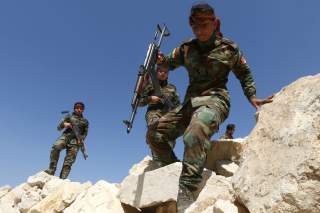The Iran Plan: Can America Contain Tehran's Damage?
Another major war in the region will only further work to the advantage of the Islamic Republic and the Islamic State at the expense of the already very weak constellation of Arab states.
Tensions between the United States and Iran are at an all-time high. Both sides are engaging in high-stakes moves to force a behavioral change in the other. Washington and Tehran both wish to avoid war, however, in such an escalatory environment, the risks of miscalculations significantly increase. Regardless of the outcome of this struggle, Iran is likely to retain its regional influence across the northern rim of the Middle East because of the chronic weakness of the Arab world.
The emergence of the Islamic State is a major unintended consequence of the U.S. war in Iraq. A much more significant repercussion, however, is that the 2003 move to effect regime change in Baghdad served as an enabler for Iran’s efforts to emerge as a regional power. Since then, the United States has been caught in a causality loop whereby its efforts to counter transnational jihadism leads to greater room for maneuver for Iran and vice-versa. The current state of U.S.-Iranian brinksmanship has to do with the fact that the United States cannot allow Iran to augment its gains from the weakening of the Islamic State.
Iran is clearly out to undermine the existing regional security architecture. The Iranian strategy is largely based on acting by proxy via Shia (mostly Arab) militias and not just on its western flank extending to the Mediterranean but also on the Arabian Peninsula. Indeed, we are now seeing an increasingly aggressive campaign of attacks from the pro-Iranian Houthi rebels in Yemen on Saudi Arabia’s territory. The other less talked about part of the clerical regime’s strategy is that of negotiations, which is far more critical.
All things being equal negotiations should be a positive thing and definitely an alternative to war. In this case, it is not as simple though, as Tehran seeks to consolidate the gains made by its proxy militias (whose combined regional strength is about a hundred thousand combatants) through the process of negotiations. These militias overtime—as we have seen in Lebanon and Iraq—evolve into political movements that entrench themselves into mainstream politics. As their patron, Iran, by weaponizing the dialogue process, becomes a major stakeholder in these countries. That is how it has been able to increase its geopolitical footprint in the Arab world.
The geosectarian logic of the regional conflict is as such that Sunni resistance to Iranian expansionist designs is spearheaded by the Islamic State, Al Qaeda and other Salafist-jihadist actors. In this way, the United States is constantly trying to balance between Shia and Sunni radicalisms—primarily because of the incoherence within mainstream Sunni Arab space. Washington will continue to find itself oscillating between countering the Islamic Republic of Iran and jihadist non-state actors until mainstream Sunni Arab actors are able to act as an effective bulwark against both the threat from the sectarian “self” and the “other.” In the long run, this perpetual swinging of the pendulum risks strengthening both Iran and the jihadists and, by extension, shrinking the space for Sunni Arab state actors.
Just as transnational jihadism thrives from war, Iran also immensely benefits from conflict in the region. In fact, though they are bitter enemies, Tehran and the Islamic State need each other to be able to advance their respective causes. The chief difference is that the Islamic State—being the most extremist Sunni Islamist non-state force—elicits a massive response in the form of a global coalition, which prevents it from consolidating itself as a regime. Meanwhile, the Islamic Republic is a state actor—a status that it is able to leverage towards its goal of becoming an internationally recognized regional power.
Thus, another major war in the region will only further work to the advantage of these two actors at the expense of the already very weak constellation of Arab states. Efforts to counter Iran sans the outbreak of hostilities should continue and whatever negotiated settlement the Trump administration is able to reach should be tactical. In the short-term, the goal must be to prevent Iran from securing a permanent role in the affairs of the Arab world. In the long-term, however, Iran’s advances cannot be rolled back without repairing the rupture in the fabric of the Sunni Arab world.
Dr. Kamran Bokhari is a nonresident scholar at the Arabia Foundation and Founding Director at the Center for Global Policy where he heads the Governance in Muslim-Majority States program. Dr. Bokhari is also the Central Asia Studies Course Coordinator at U.S. Department of State's Foreign Service Institute and tweets at @KamranBokhari
Image: Reuters

